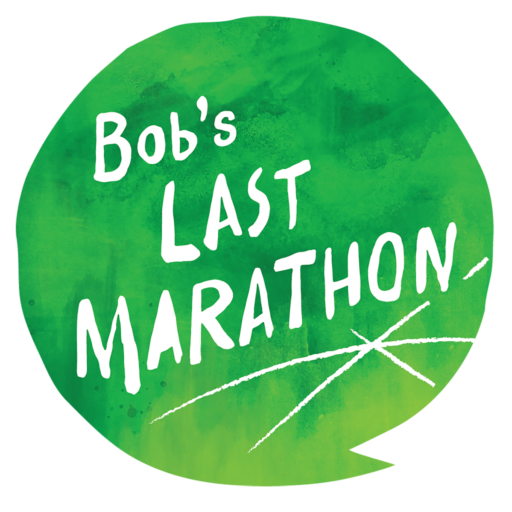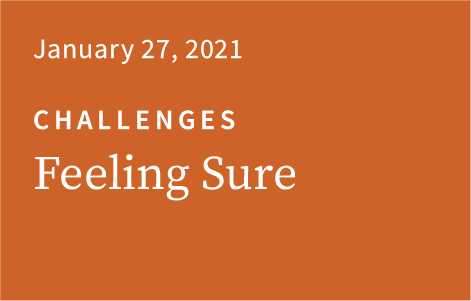Transcript
Feeling Sure – Katie Brandt’s Story
In the summer of 2011, my 2-year-old son Noah and my 31-year-old husband Mike were the same. What I mean is, they had more in common than most fathers and sons. They were entertained by many of the same things, they were bad at following directions, they both showed erratic behavior. All typical for a toddler—not so much for a grown man, unless you have Mike’s condition: frontotemporal dementia or FTD. So while Mike and Noah were on a similar cognitive level, their needs were very different.
I was the key caregiver for both—as well as for my father, who had early-onset Alzheimer’s.
With the recent passing of my mother, I felt very alone and overwhelmed with the responsibility of making so many health care decisions and choices for my family.
When Mike’s condition deteriorated the year before, I made the difficult decision to move him to a neuro-rehabilitation center nine miles away. I was aware this meant less time for Noah to know his father—and for Mike to enjoy his son. So when the care manager asked about my goals for Mike’s care, I immediately answered, “Family time.”
We set the stage for visits by following a routine: a short activity, a snack, a photo. Noah and I would arrive with bubbles, hula hoops, or balls and wait for Mike and his therapist outside the locked unit door. I would entice both to the courtyard with a snack.
Snacks were important. Mike and Noah had to have the same, otherwise Mike would want to take what Noah had, and vice versa. There was always a staff person with us to give both Mike and Noah one-to-one support and help take the required family photo.
It sounds organized, but felt more like a bizarre circus. Mike quickly circling the brick courtyard path. Noah running back and forth, pushing the handicap button to open the courtyard door. Noah hiding in the bushes and screaming “Boo!” at Mike. Mike and Noah laughing.
I didn’t worry about time; a 15-minute visit one day could be a 40-minute visit the next. I looked for special moments.
Sometimes when Mike was on one of his walks, Noah would reach up and take his hand. They would stroll, not talking, for a lap or two. One time, in fun, Noah whacked Mike on the head with a stick. Just as I was about to reprimand Noah, Mike burst out with a huge belly laugh, which made Noah giggle uncontrollably. Their shared joy was so clear, I had to let it go.
As summer turned to fall, I began to notice changes. Noah was mastering the art of scooping guacamole onto tortilla chips—his favorite snack—as Mike started to lose that skill. Noah showed interest in potty training while Mike’s staff and I discussed the need for adult diapers both night and day. Noah became a sturdy, steady runner as we started worrying about Mike’s balance and risk for falls.
I had a pit in my stomach before each family visit. I found it harder and harder to get Mike to focus on Noah—who seemed less and less enthusiastic about our family visits. Once when I was buckling Noah into his car seat before seeing Mike, he said to me, “Daddy scary.”
That was a turning point.
We were reaching a new mile marker in the FTD journey and with it, a new decision.
How many more visits would my son have with his father? I felt an overwhelming urge to protect Noah. I knew his memories of Mike would be limited and I didn’t want them to be negative or scary.
And, just as fiercely, I wanted to protect Mike. He had wanted to be a dad for so long and he loved Noah so completely. I wanted to preserve Mike’s dignity and the positive feelings between him and Noah.
In the end, I would rather Noah have just a few happy memories than many sad ones—but was this the right decision?
This moment was an example of isolation in my caregiving experience. With my mother recently passed and my father in the early stages of Alzheimer’s, I had no parents to turn to for advice. Certainly, none of the other moms in my Mommy & Me classes were grappling with this issue. I felt judged for bringing Noah into the neuro-rehab center, and equally guilty for thinking about keeping him out. I could only share my thoughts with a select few. Virtually alone and unsure of myself, I wondered whether I was making the right decision.
I stretched the time between visits to days and weeks, finally planning for a dual birthday party in March. Noah would be three, Mike thirty-two. We had an ice cream cake and presents. There were balloons and streamers. A photographer whom I had met through the FTD support group donated her time to take family pictures of us. It felt like the end of something. A celebration that was a goodbye.
Six weeks later, Mike was in a wheelchair full time. Falling frequently and unable to engage the motor skills to stand up, he was safer strapped into a chair. I didn’t want Noah to see him that way. The time from one visit to the next got longer.
Then one day in the car, Noah said to me, “I just want to say hi to Daddy.” It was a request I couldn’t deny. So I made a plan with Mike’s favorite aide to have Mike sitting at a courtyard table when Noah arrived, the wheelchair hidden out of sight. I brought ice cream from Friendly’s. Noah fed himself while the aide fed Mike. Noah ran around the courtyard and I could see Mike watching him. Noah sang songs for our applause and laughed when I bestowed eyelash butterfly kisses on Mike’s cheeks. We took a family photo. As Noah and I walked out of the courtyard, Mike stayed seated. Noah blew him kisses with his chubby 3-year-old hand and yelled a quick “Bye, Daddy! Love you!” As we walked down the hall to the exit, I knew it was the last visit. I felt sure. I just didn’t know if I felt right.
Less than a year later, a week after Mike’s funeral, and Noah’s 4-year-old voice piped up from the backseat: “Mom? Can Memere talk in heaven?” I wondered why Noah was asking about my mom, who had passed away three years before. “Yes, of course Memere can talk in heaven.” Noah was quiet for a few moments, and then said, “Mom? Can Daddy laugh in heaven?” That got my attention. “Noah, are you remembering that Daddy didn’t talk, but that Daddy laughed?” Noah was quick to respond, “Yeah, Daddy not talk, but Daddy laugh a lot.”
There it was.
After not seeing Mike for nine months, Noah had a positive memory of his father. Thinking of him laughing. Laughing in heaven. That moment was a gift for me. A gift for Mike. To know that locked inside our son’s heart there was a memory of joy and happiness gave me hope. Hope that Noah could grow up with memories he would want to keep. Because I had protected his heart and his father’s dignity. It finally felt like the right choice.
Katherine Diane Brandt
Director of Caregiver Support Services and Public Relations
Massachusetts General Hospital Frontotemporal Disorders Unit

